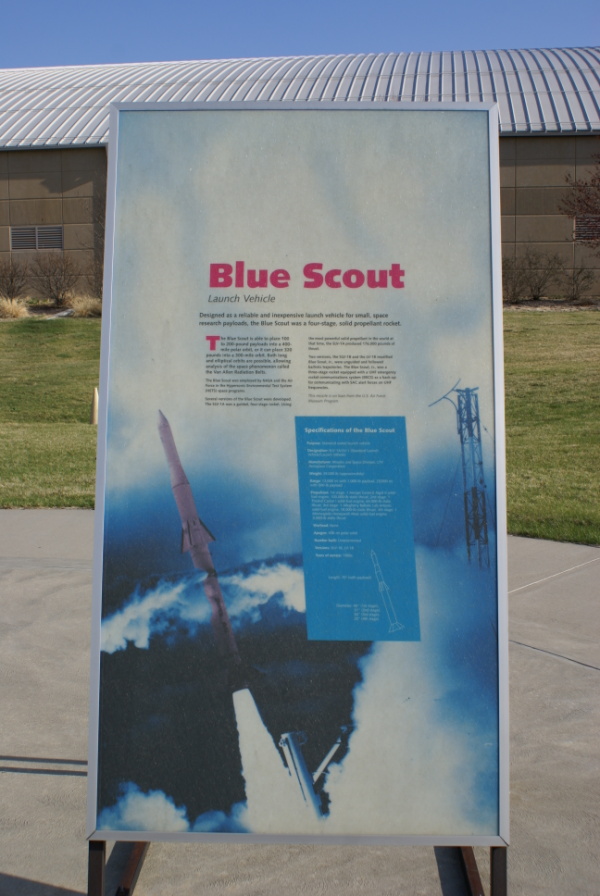| Prev |
heroicrelics.org Strategic Air Command & Aerospace Museum Site Index Blue Scout Gallery |
Next |
dsc60107.jpg
The sign accompanying the missile. It reads
Blue Scout
Launch VehicleDesigned as a reliable and inexpensive launch vehicle for small, space research payloads, the Blue Scout was a four-stage, solid propellant rocket.
The Blue Scout is able to place 100 to 200-pound payloads into a 400-mile polar orbit, or it can place 320 pounds into a 300-mile orbit. Both long and elliptical orbits are possible, allowing analysis of the space phenomenon called the Van Allen Radiation Belts.
The Blue Scout was employed by NASA and the Air Force in the Hypersonic Environmental Test System (HETS) space programs.
Several versions of the Blue Scout were developed. The SLV-1A was a guided, four-stage rocket. Using the most power solid propellant in the world at the time, the SLV-1A produced 176,000 pounds of thrust.
Two versions, the SLV-1B and the LV-1B modified Blue Scout, Jr., were unguided and followed ballistic trajectories. The Blue Scout, Jr., was a three-stage rocket equipped with a UHF emergency rocket communications system (ERCS) as a back-up for communicating with SAC alert forces on UHF frequencies.
This missile is on loan from the U.S. Air Force Museum Program.
Specifications of the Blue Scout
Purpose: Standard rocket launch vehicle
Designation: SLV-1A/LV-1 (Standard Launch Vehicle/Launch Vehicle)
Manufacturer: Missiles and Space Division, LTV Aerospace Corporation
Weight: 39,000 lb (approximately)
Range: 12,000 mi with 1,000-lb payload, 25,000 mi with 500-lb payload
Propulsion: 1st stage: 1 Aerojet General Algol II solid-fuel engine, 103,000-lb static thrust. 2nd stage: 1 Thiokol Castor I solid-fuel engine, 64,000-lb static thrust. 3rd stage: 1 Allegheny Ballistic Lab Antares solid-fuel engine, 18,000-lb static thrust. 4th stage: 1 Minneapolis Honeywell Altair solid-fuel engine, 3,000-lb static thrust.
Warhead: None
Apogee: 400-mi polar orbit
Number built: Undetermined
Versions: SLV-1B, LV-1B
Years of service: 1960s
Length: 70' (with payload)
Diameter: 40" (1st stage) 31" (2nd stage) 30" (3rd stage) 25" (4th stage)

| Time picture taken | Fri Apr 17 09:00:44 2009 |
| Location picture taken |
Parking Lot Strategic Air & Space Museum Ashland, NE |
| Prev |
heroicrelics.org Strategic Air Command & Aerospace Museum Site Index Blue Scout Gallery |
Next |